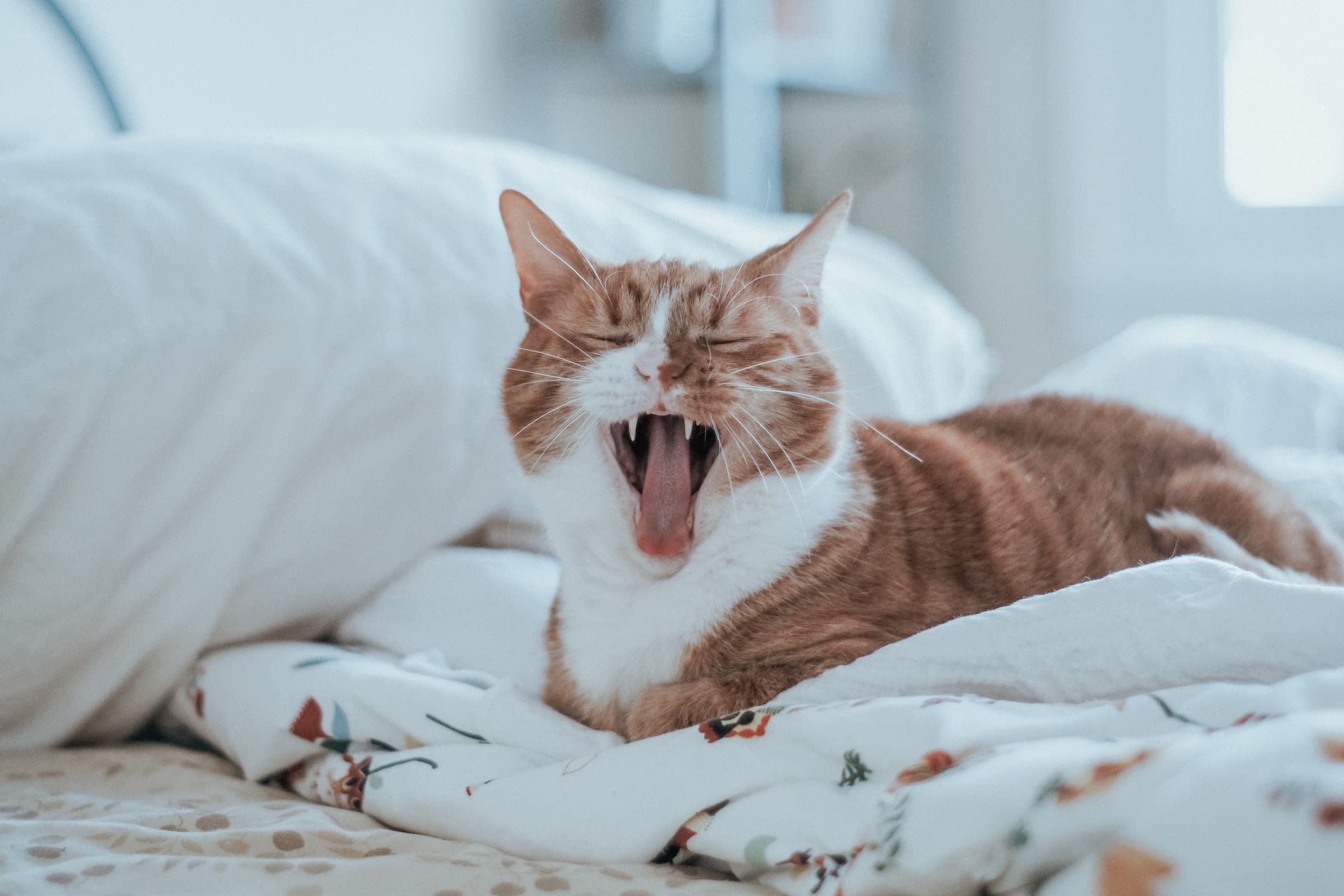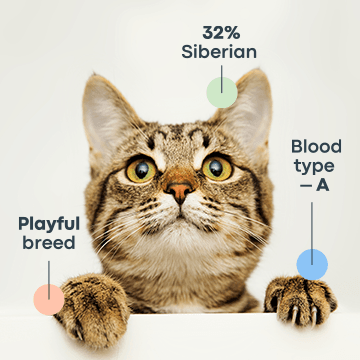Introduction: The Mystery of the Blep
Have you ever noticed your cat’s tongue peeking out? Just slightly, in what the internet affectionately calls a blep. It's undeniably adorable and often leaves cat owners amused. This behavior is typically harmless. Yet, there are instances where it might signal underlying health concerns. So, why do cats stick their tongue out? And when should you be concerned?
Normal Reasons Why Cats Stick Their Tongue Out
Relaxation and Sleep
Humans sleep with their mouths slightly open. Cats can exhibit similar behaviors. A feline’s jaw muscles may loosen up during deep sleep. According to Zoetis, this causes their mouth to open slightly and their tongue to protrude. This relaxed state is entirely normal. So just enjoy the spectacle as there is usually nothing to worry about.
Blepping: The Accidental Tongue Slip
The term “blep” describes the endearing sight of a cat with tongue out. This often occurs when a cat becomes distracted. Activities like grooming or eating are common examples. The cat simply forgets to retract their tongue. A blep cat is definitely adorable. Science attributes this to a temporary lapse in the cat's muscle control. The tongue remains visible until the cat becomes aware of it.
Grooming and Cleaning
Cats' tongues are a marvel of nature. They are equipped with tiny, hook-like structures called papillae. These aid in grooming by acting like a built-in hairbrush. This helps cats in cleaning their fur efficiently. Occasionally a cat might pause and become distracted during the session. This leaves their tongue partially extended. This is perfectly normal cat grooming behavior. No need to rush to the vet. Just wait for the grooming session to be over, and the tongue will go right back.
Investigating New Smells (Flehmen Response)
Cats possess a specialized organ called the Jacobson's organ. It’s located on the roof of their mouth. The purpose of this organ is to analyze scents more deeply. Cats exhibit the Flehman response when they encounter a particularly intriguing smell. This involves curling back their lips. Next, they open their mouths slightly. Sometimes they stick out their tongue to draw the scent into the organ for analysis. It's common in male cats to detect pheromones.
Playfulness and Excitement
Some cats might stick their tongues out during moments of play or excitement. This can be a spontaneous expression of their excitement. A positive reaction from their human companions means they might repeat it. It means the cat is engaging in social learning. They are reinforcing the behavior to get more attention and affection. In such cases, there is a simple way to make them stop. Don’t react in any way when they stick their tongue out. After a few times, they will realize that they are not eliciting the reaction they want. On the other hand, if this amuses you, then let them go crazy. After all there is no harm in occasional blepping.
Genetics: Some Breeds Are More Prone to Blepping
One cat breed may have more of a tendency for blepping than others. Brachycephalic (flat-faced) cats are a good example of this. Never heard of them? These are Persians and Exotic Shorthairs. Unique facial structures mean their tongues are rarely inside the mouth. This can make it challenging to keep their tongues entirely inside their mouths. Cats with missing teeth may also find it difficult to hold their tongues in place. This leads to frequent blepping. This is especially true for felines missing the prominent canine teeth (fangs).
When Sticking the Tongue Out Is a Concern
When a cat's tongue is sticking out it may be harmless. However, certain situations warrant closer attention.
Dental Issues and Oral Pain
Dental problems can cause a cat to stick their tongue out. This is because of the discomfort they feel. Some of the common dental issues they face are listed below.
Gingivitis. It is an inflammation of the gums.
Periodontitis. This is an advanced gum disease. It affects the tissues supporting the teeth.
Tooth resorption. It involves the breakdown of tooth structure.
Oral infections. These can be caused by bacterial infections within the mouth.
Foreign objects. Items like splinters or food particles lodged in the mouth may be the culprit.
Warning signs accompanying the sight of cat tongue out may include:
Bad breath
Excessive drooling (PetMD recommends immediate vet attention)
Difficulty eating or a preference for chewing on one side
Respiratory Issues and Panting
Why do cats stick their tongue out sometimes like dogs? Unlike dogs, cats do not typically pant. A cat hanging tongue out and panting could indicate respiratory infections, especially if accompanied by sneezing, nasal discharge, and labored breathing. Asthma is another possible cause, as chronic inflammation of the airways can lead to breathing difficulties. Heatstroke may also cause excessive panting, as the body attempts to cool down.

When to worry
Panting persists for more than a few minutes. This means that the panting is caused by an underlying problem.
Accompanied by lethargy or disorientation. Cats are very alert creatures. Any lethargy is often a sign of trouble.
Occurs in a cool environment without obvious cause. When they are in a cool area, cats have no reason to pant. Try to pinpoint the cause. Go to the vet if you cannot figure it out.
Neurological or Cognitive Issues
Senior cats or those with neurological conditions may exhibit tongue protrusion due to impaired muscle control. Other signs to watch for include:
Confusion or disorientation
Wandering aimlessly
Sudden loss of coordination
Increased vocalization
When to see a vet
It's essential to distinguish between a cute blep cat and behaviors that may signal health issues. Immediate veterinary attention is recommended if:
The tongue sticking out is sudden or excessive;
Accompanied by drooling, lethargy, or weight loss;
There is difficulty breathing or a blue-tinged tongue.
Quick-Reference Symptom Chart
Symptoms
| Possible Concerns | Action Needed |
Panting with tongue out | Overheating, heatstroke, stress, pain, respiratory distress | If excessive, persistent, or accompanied by weakness, seek immediate vet attention. Provide water and move to a cool area. |
Drooling, bad breath, difficulty eating | Dental disease, oral infection, foreign object, nausea, poisoning | Schedule a vet visit for a dental exam or possible underlying illness. Check for foreign objects in the mouth. |
Blue-tinged tongue | Lack of oxygen (cyanosis), heart disease, lung disease, choking, poisoning
| Emergency! Seek immediate vet care as this indicates severe respiratory or circulatory distress. |
Sudden, excessive tongue protrusion | Neurological issue, trauma, oxygen deprivation, heatstroke | If prolonged or paired with other symptoms (e.g., seizures, breathing issues), see a vet immediately. |
Pale or white tongue
| Anemia, blood loss, shock, circulatory problems
| Immediate vet attention is needed to identify the underlying cause. |
Swollen tongue | Allergic reaction, insect sting, poisoning, trauma | Emergency! Administer first aid if applicable (e.g., antihistamines for allergic reactions) and go to the vet immediately. |
Black or dark spots on tongue | Normal pigmentation, melanoma, oral cancer | Normal in some breeds. If new or changing, have a vet examine it. |
Final Thoughts
While a cat sticking their tongue out can often be a charming and harmless behavior, it’s important to remain vigilant. In many cases, it’s a sign of relaxation, playfulness, or even curiosity. However, if your cat’s tongue protrusion is persistent or linked to other concerning symptoms like drooling, panting, or lethargy, it could indicate an underlying health issue. By observing your cat's behavior and consulting your vet when necessary, you can ensure your furry companion stays well and content.
Frequently Asked Questions
Do cats stick their tongue out when they’re happy?
When we see what looks like a smiling dog, we often equate that to happiness and contentment. This can be the same for cats in some instances. Relaxation and being content often go paw-in-paw, so you may see a tiny bit of your cat or kitten’s tongue out on occasion when they’re relaxed, at rest, and enjoying themselves.
Why do cats do the blep?
Blepping can be attributed to several causes, such as the Flehman Response to a scent nearby, relaxation, distraction, or, at times, illness. Always consult your veterinarian if you have any concerns about your feline friend’s behavior and health!
Why does my cat sometimes stick his tongue out for long periods?
Prolonged protrusion can result from various issues. These may be dental, respiratory or neurological. It's advisable to consult a veterinarian to determine the underlying cause.
What does it mean when you're petting your cat and its tongue tip is sticking out of its mouth?
It indicates deep relaxation. Your cat feels comfortable and loosens their jaw muscles. This causes the tongue to protrude slightly.
Why does my cat stick his tongue out and lick me or random objects?
Cats use licking as a means to explore their environment. They also do this to show affection. It is also a way for cats to explore scents.





